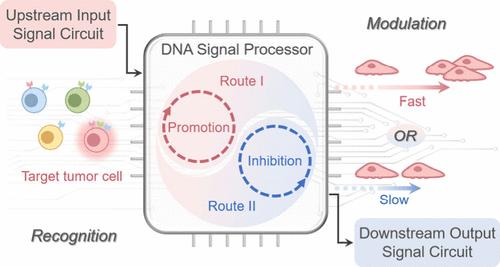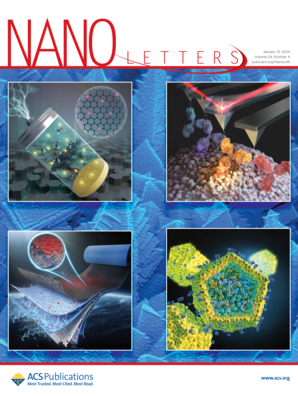由 ATP 控制的肿瘤细胞特异性信号处理平台,用于无创调节细胞行为
IF 9.6
1区 材料科学
Q1 CHEMISTRY, MULTIDISCIPLINARY
引用次数: 0
摘要
调节膜受体的空间分布可以人为地重塑细胞行为,而细胞行为在各种生理和病理过程中发挥着关键的生物学作用。在这里,我们构建了一个肿瘤细胞特异性信号处理平台(TCS-SPP),用于可控地促进/抑制细胞间充质上皮转化因子(c-Met)受体二聚化,从而非侵入性地调节细胞行为。在上游输入信号电路(UISC)中识别出双适配体以区分目标癌细胞后,膜锚定 DNA 信号处理器(DSP)会被激活,通过滚动圈放大(RCA)进行信号放大,然后通过 ATP 分子开关进行信号转换,在下游输出信号电路(DOSC)中实现受体调控。得益于 DSP 的刚性结构、保护效应和 RCA 产品的空间限制效应,这种 TCS-SPP 在精确调控细胞迁移、侵袭和增殖等细胞行为方面表现出良好的性能,在癌症靶向治疗和生物医学工程应用方面显示出巨大的潜力。本文章由计算机程序翻译,如有差异,请以英文原文为准。

Tumor Cell-Specific Signal Processing Platform Controlled by ATP for Non-invasive Modulation of Cellular Behavior
Regulating the spatial distribution of membrane receptors can artificially reprogram cellular behaviors, which play a critical biological role in various physiological and pathological processes. Herein, we construct a tumor cell-specific signal processing platform (TCS-SPP) for controlled promotion/inhibition of cellular-mesenchymal epithelial transition factor (c-Met) receptor dimerization to noninvasively modulate cellular behaviors. Upon the dual-aptamer recognition in the upstream input signal circuit (UISC) to discriminate target cancer cells, the membrane-anchored DNA signal processor (DSP) is activated for signal amplification via rolling circle amplification (RCA) followed by the working of an ATP molecular switch for signal conversion, achieving receptor modulation in the downstream output signal circuit (DOSC). Benefiting from the rigid structure of DSP, the protective effect, and spatial confinement effect of RCA products, this TCS-SPP has demonstrated good performance in accurately modulating cellular behavior such as cell migration, invasion, and proliferation, showing great potential for targeted cancer therapy and biomedical engineering applications.
求助全文
通过发布文献求助,成功后即可免费获取论文全文。
去求助
来源期刊

Nano Letters
工程技术-材料科学:综合
CiteScore
16.80
自引率
2.80%
发文量
1182
审稿时长
1.4 months
期刊介绍:
Nano Letters serves as a dynamic platform for promptly disseminating original results in fundamental, applied, and emerging research across all facets of nanoscience and nanotechnology. A pivotal criterion for inclusion within Nano Letters is the convergence of at least two different areas or disciplines, ensuring a rich interdisciplinary scope. The journal is dedicated to fostering exploration in diverse areas, including:
- Experimental and theoretical findings on physical, chemical, and biological phenomena at the nanoscale
- Synthesis, characterization, and processing of organic, inorganic, polymer, and hybrid nanomaterials through physical, chemical, and biological methodologies
- Modeling and simulation of synthetic, assembly, and interaction processes
- Realization of integrated nanostructures and nano-engineered devices exhibiting advanced performance
- Applications of nanoscale materials in living and environmental systems
Nano Letters is committed to advancing and showcasing groundbreaking research that intersects various domains, fostering innovation and collaboration in the ever-evolving field of nanoscience and nanotechnology.
 求助内容:
求助内容: 应助结果提醒方式:
应助结果提醒方式:


